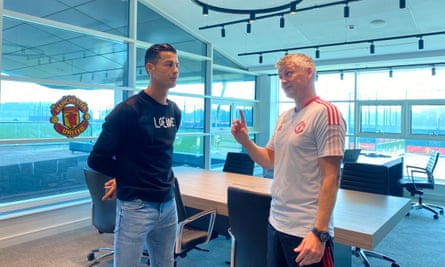Cristiano Ronaldo may well make his return for Manchester United at Old Trafford on Saturday. On the pitch or not – every camera will be fixed on him. Every stretch. Every light jog. Every side-foot pass. Every stepover. Every perfect header.
Whether he is what Manchester United need is a different question, but for the club and the Premier League it is an incredible signing. Thirty-six years old, still breaking records, still generating the headlines, still demanding the shirt numbers.
I remain a Messi ultra, moved far more by players who give the impression they’re playing three and in against a garage door. Give me Berbatov and Hoddle over players who look like they’ve had to hone their craft.
Ronaldo has honed his to such an extent that he is the epitome of an elite sportsman. Beyond the talent – the work ethic, the desire to win, the singlemindedness. It’s tiring even thinking about that kind of dedication.
Cue understandable excitement on his arrival. “He is a great player, a great human being,” said Ole Gunnar Solskjær. “Wow, wow, wow. He’s home,” tweeted Marcus Rashford. Jesse Lingard posted an incredibly cute picture of him as a kid in the United youth team with a teenage Ronaldo looking on. United fans have been queuing out of the club shop to get a new No 7 shirt. It will be fascinating to see if it works.
welcome home @Cristiano ❤️ pic.twitter.com/jrCnGsv8oD
— Jesse Lingard (@JesseLingard) August 27, 2021
There is, however, a more troublesome side to the almost universal delight with which he’s been received. An allegation of rape against him in 2009 – first reported by Der Spiegel in 2017 – has been conspicuous by its absence in most coverage since the signing.
In June 2009, Ronaldo met Kathryn Mayorga in a Las Vegas bar. They ended up in a group of people in his hotel apartment. Mayorga claims Ronaldo raped her. Ronaldo has consistently denied the allegations. He claims they had consensual sex. Der Spiegel’s reporting in 2017 and 2018 uses a collection of articles and documents retrieved as part of the Football Leaks story. Ronaldo has described those documents as a fabrication.
Later in 2009 Ronaldo’s lawyers paid Mayorga $375,000 as part of a non-disclosure agreement. In 2018, Ronaldo’s lawyers said: “This agreement is by no means a confession of guilt … Cristiano Ronaldo merely followed the advice of his advisors in order to put an end to the outrageous accusation made against him, in order precisely to avoid attempts, such as those we are now witnessing, to destroy a reputation built thanks to hard work, athletic ability and behavioural correction.”
In September 2018, Mayorga waived her right to anonymity. Las Vegas police reinvestigated the claims but decided they could not “be proven beyond reasonable doubt”. Mayorga has filed a civil lawsuit in the US for battery, intentional infliction of emotional distress, coercion, fraud, abuse of a vulnerable person, racketeering, defamation, abuse of process, negligence and breach of contract.
In October 2018 Ronaldo tweeted: “I firmly deny the accusations being issued against me. Rape is an abominable crime that goes against everything that I am and believe in. Keen as I may be to clear my name, I refuse to feed the media spectacle created by people seeking to promote themselves at my expense.”

How do we navigate this part of Ronaldo’s story? Is it wrong to bring it up now – on the eve of his return? Is it wrong to bring it up at all, to remind people of an allegation that did not end in a conviction or go to a criminal trial? You can’t just mention it a little bit. During a broadcast how do you change gears from: “What does this mean for Anthony Martial and Mason Greenwood?” to: “Well, there are these allegations …”?
Sport is entertainment, it’s an escape. Whether you sit on your sofa for Super Sunday or take your place in the Stretford End, it is two hours where you don’t have to think about life’s complexities. It is precisely the time where you don’t want to be morally conflicted.
But if we want sport to be for everybody, then we need to be able to have difficult conversations. When we talk about our heroes we need to discuss them in their entirety – their strengths and weaknesses, their potential vulnerabilities and their flaws.
I’ve been in radio studios nostalgically discussing the supreme boxing talents of Mike Tyson while all the time thinking: he’s a convicted rapist. In the hours and days after Kingsley Coman’s winner for Bayern Munich in the Champions League final in 2020, very few people mentioned his admission of guilt for beating up the mother of his child in 2017.
With Tyson (a conviction) and Coman (an admission) the case is demonstrably clearer than with Ronaldo. But football – and elite sport – has a difficult relationship with claims of sexual and domestic violence. Despite the amount of work that still needs to be done on racism, sexism, homophobia and corruption, those conversations do happen.
This problem extends to the watching audience too. In July, the London School of Economics’ Centre for Economic Performance published a paper that suggested early kick-offs were causing more people to beat up their partners.
“What we actually substitute is a kind of visible crime for invisible crime,” said Tom Kirchmaier, director of the policing at LSE’s Crime Research Group. “You have less crime around the stadium and so on, but you have issues more than eight hours later at home.” More men who go to football, get pissed, go home – and beat up their partners.
I am excited about Ronaldo. I am excited to see what he does for Manchester United. But football has to take a long hard look at its culture.
So what do we do? Support charities such as Women’s Aid. Listen to them. And be prepared to engage with them.

